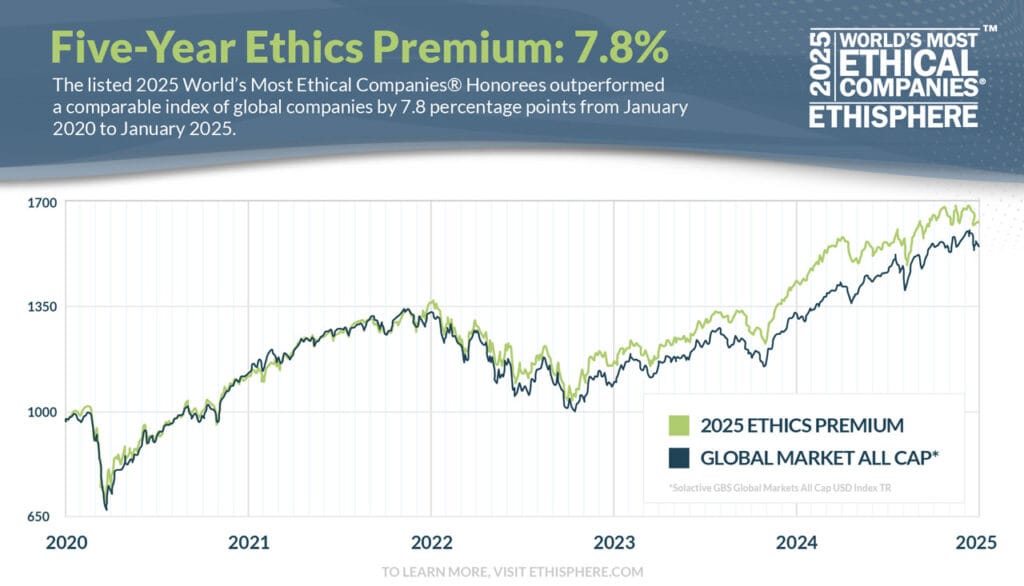A Recognition That Signals Trust, Integrity, and a Long-Term Focus
The World’s Most Ethical Companies celebrates and promotes companies that prioritize ethical business practices. Earning this title highlights your company’s leadership in ethical business, fostering trust and resilience while strengthening your reputation with customers, employees, and investors.
Request an ApplicationBeing a World’s Most Ethical Company Sets You Apart
01 Strengthens Your Brand
In today’s values-driven market, trust is everything. Strengthen your reputation and position your company as a trusted leader in ethical business. The World’s Most Ethical Companies designation signals strong trust, with consumers 92% more likely to choose a company with this recognition over other corporate accolades.
02 Celebrates Employees
This achievement isn’t just about the organization – it’s about the people who make it happen. Showcase the dedication, integrity, and leadership of your people. Employees in a culture that values recognition are up to 91% more likely to thrive.
03 Attracts Talent
Top talent seeks purpose-driven organizations. Signal to future employees that your organization values integrity, transparency, and doing what’s right. 75% of Gen Zs and millennials say that community engagement and societal impact is an important factor when considering a potential employer.
The 2025 Honorees
The Business Case for Integrity
Ethical leadership isn’t just the right thing to do – it’s a competitive advantage. Companies that prioritize integrity see stronger financial performance, enhanced brand reputation, and long-term resilience. See why being one of the World’s Most Ethical Companies matters for business success.

Why it matters
Nearly 90% of a company’s value comes from intangible assets like brand reputation, intellectual property, and human capital. The World’s Most Ethical Companies applicants are evaluated in areas including ethical culture, governance, leadership, and corporate responsibility. It celebrates those who invest in areas directly tied to protecting and enhancing intangible assets. Recognition demonstrates an organization’s commitment to safeguarding these assets, fostering stakeholder trust, and positioning for sustainable, long-term success.
Learn More About the ProcessThe Ethics Premium – A Business Advantage
Strong Ethics Make for Good Business.
Over the past 19 years, we’ve tracked the World’s Most Ethical Companies as they outperformed peers and competitors, demonstrating a link between ethical behavior and financial performance. We call this link the Ethics Premium.
This outperformance is the result of the kinds of practices that lead a company to be recognized – investments in their people, culture, and communities that increase engagement and decrease risk.
2025 World’s Most Ethical Companies

Tangible Business Value
Not your average corporate award, the World’s Most Ethical Companies honor combines a rigorous evaluation process and provides tangible value to Ethics and Compliance teams with a focus on ethics as a driver of business success.
All applicants receive a detailed benchmarking scorecard and expert evaluation of their submitted documentation that that provides insights into their overall E&C program, identifying strengths, program benchmarks, and areas for improvement.
Learn More about ApplyingFrequently Asked Questions
Past participants consider completing the World’s Most Ethical Companies process to be extremely valuable, regardless of the recognition that may or may not come from it. The application process enables organizations to understand the elements of an effective program and to also compare their approach to leading practices. It also provides opportunities for ethics and compliance teams to collaborate with other key stakeholders across business functions and work together to answer certain questions.
Upon completing the process, applicants receive a scorecard which outlines their evaluation scores as they compare to honorees and documentation scores. Companies have found this information to be valuable for establishing priorities, celebrating their strengths, building a business case for additional budget, and focusing their teams. The scorecard also includes exclusive data and insights only available to applicants, and links to valuable, curated resources to help improve their programs.
Applicants with exceptional program elements may be featured in Ethisphere Magazine, Ethicast, and other Ethisphere platforms, such as our Global Ethics Summit or webinars.
Public or private, for-profit or not-for-profit, U.S. or foreign based organizations generally are eligible to participate in the process and be considered for designation as one of the World’s Most Ethical Companies.
The Ethics Quotient questionnaire and peer group is generally designed for those organizations with over $250 million in revenue. That said, smaller organizations can still benefit from the process and be designated as one of the World’s Most Ethical Companies if they have the type of programs in place typically seen at larger organizations.
Please note that while our process has broad eligibility requirements, non-profit colleges and universities, governments, governmental agencies, government majority owned organizations, self-regulatory organizations (SROs), and non-governmental organizations (NGOs) generally are not eligible. If you have a question regarding eligibility, please contact Ethisphere at [email protected].
We encourage wide participation, regardless of whether an organization thinks that it will be honored. All organizations that submit a survey will receive an Analytical Scorecard that provides their overall Ethics Quotient and evaluates how their score in each of the five categories compares to those of honorees. The value in participating is not only in learning how one’s organization compares to the honorees, but also in better understanding what’s trending in leading organizations and more about their best practices.
A real benefit to participating in the Ethics Quotient® (EQ) process is that all participants, whether or not they’re honored, receives access to a Digital Analytical Scorecard experience. It provides an overview of how the applicant scored against the World’s Most Ethical Companies honorees in key categories and offers access to 15-18 key Ethics Quotient data points, along with associated resources, in an interactive format powered by The Sphere—Ethisphere’s Ethics and Compliance benchmarking platform. This is an important and valued outcome of the process, since many organizations are looking to move forward both in compliance activities and ethical corporate behavior. This independent review allows an organization to compare itself not just to any group of organizations that want to complete a survey, but to those who excel and are named as the World’s Most Ethical Companies.
This will be the 20th year Ethisphere will honor organizations with the designation of World’s Most Ethical Companies.
We evaluate an organization’s (i) Ethics and Compliance Program, (ii) Culture of Ethics, (iii) Corporate Citizenship and Responsibility, (iv) Governance, and (v) Third Party Management. Each category is evaluated through a combination of answers to our Ethics Quotient® (EQ) questionnaire, submitted supplemental documentation, and where necessary, independent research and follow up with a candidate. Evaluation also includes a review of publicly available information with a bearing on an organization’s reputation for acting ethically (e.g., public filings, regulatory activity, media review). If the review team has a concern after this independent analysis, we will reach out to the applicant to discuss.
An organization’s final Ethics Quotient (EQ) score is evaluated relative to those of its peers within the context of its structure, size, and operating environment. Those organizations demonstrating the strongest application across our methodology receive the designation of being one of the World’s Most Ethical Companies. As applicant organizations come from a variety of industries with significant differences in regulatory and operating environments, the overall EQ score is used to understand an organization’s performance in context of similar organizations, not to set a floor. However, reputation and legal issues are carefully evaluated. Receiving a materially deficient score in the category of Leadership and Reputation will prevent an organization from being selected as one of the World’s Most Ethical Companies.
The World’s Most Ethical Companies evaluation is an annual exercise. The Application period opens at the end of July and closes at the end of October. Each year’s evaluation process considers organization programs information at the time it is submitted by the applicant and considers reputational information available up to December 31st of the year being reviewed.
Past honorees are given no inherent advantage over non-honorees or organizations applying for the first time. Typically, organizations that have participated in the evaluation process in previous years (both honorees and non-honorees) are more familiar with the expectations and application process.
Applicants trust us to keep all analysis and results of each organization confidential. We take that responsibility seriously. We do not disclose the names of organizations who are not honored, and no individual response is made public. Responses will only be used to calculate EQ scores and/or provide a report or analysis to an organization. We also use EQ scores and responses in an aggregated or anonymized fashion for benchmarking and research purposes.Additionally, honorees may not publicly share or reference their organization’s scores or performance compared to the World’s Most Ethical Companies’ averages. Our purpose is to celebrate all of the organizations equally; accordingly, we very intentionally do not rank the organizations that make the list each year. Sharing information or referring to the scores necessarily leads to a comparison among the honoree organizations. Also, the selection process compares organizations to their peers. Without context, publicizing how an organization fares against the average scores misrepresents our process and could cause confusion.
While our evaluation process begins with the objective scoring based on responses to the Ethics Quotient (EQ), our review does not end there. We also request applicants submit documentation to allow us to further evaluate aspects of their program. The information submitted provides us an understanding of the program beyond answers to the EQ. For example, the EQ asks questions about modalities of communications; the supporting documentation goes further and allows us to evaluate the quality of the communications. EQ scores are adjusted based on documentation review and independent research. Each candidate then receives a final score that may be higher or lower than the initial “self-reported” score. Note that if we are unable to evaluate certain aspects of performance (i.e., requested documentation is not submitted), the resulting scores may be discounted.
Our evaluation of an organization’s reputation looks carefully at the perception of the organization’s brand among stakeholders. We give an applicant credit for third-party recognitions indicating positive stakeholder perception. For example, we consider awards and accolades garnered as well as inclusion on indices related to governance, ethics and compliance, culture, environmental practices, citizenship, or social responsibility.
We off-set the credit given for third-party recognitions with any negative reputational issues faced by an applicant. Specifically, we conduct a review of publicly available information (e.g., public filings and the Dow Jones Factiva business information and research tool) to understand any negative perceptions caused by an applicant’s legal compliance, litigation, environmental, or other ethical issues. This review has a five-year look-back period.
Ethisphere bases its timing for the look-back period on the timing of an issue’s resolution. For example, if the conduct occurred in 2005, but the issue is settled in 2020, Ethisphere would consider the relevant timing to be 2020 for purposes of the five-year look-back period.
While evaluation of any particular issue is necessarily objective, Ethisphere considers the following factors in its evaluation: (i) how long-ago the conduct at issue occurred and when it was resolved, (ii) the seriousness of the conduct or issue, (iii) actions taken by the applicant to address the issue, and (iv) how the issue impacts the applicant’s reputation. If the issue is severe enough, it alone can exclude an organization from being included on the World’s Most Ethical Companies List. In such a case, we will fully score the applicant’s submission and provide the Analytical Scorecard and feedback. We will also inform the applicant that, regardless of its performance within our evaluation process, the reputational issue precludes it from being included as one of the World’s Most Ethical Companies.
Ethisphere’s proprietary Ethics Quotient®, the World’s Most Ethical Companies assessment process includes more than 250+ multiple-choice and free-form questions on ethical culture, environmental and social practices, ethics and compliance activities, governance, leadership, diversity, and initiatives to support a strong value chain. Applicants are able to download the questionnaire in advance of entering details into the survey platform so that they can prepare responses and gather information from other sources within the organization.
The EQ questionnaire is jointly developed by our internal team of legal and compliance professionals, feedback provided by previous applicants, and by using insights based on the ever-changing expectations of employees, managers, shareholders, regulators, and the public at large.
No. We evaluate every organization independently and then in comparison to peers within the context of structure, size and operating environment. Because we’re recognizing organizations that are the “most ethical” and not merely “ethical,” there is a natural limit to the number that we honor both in total and by sector. The number can vary based upon the ever-increasing expectations of stakeholders (both internal and external) and the fact that the scoring process is updated to reflect changes in best practice and methodology.
We strive to honor organizations based on their body of work and not just one particular policy or program that is groundbreaking or admirable. Likewise, we don’t believe that one particular controversy, settlement, fine, regulatory action, or lawsuit necessarily disqualifies an organization from being honored. That being said, these outcomes are taken into consideration during the evaluation time frame. How organizations prepare employees for ethical dilemmas, how they respond to unethical or illegal actions once uncovered, and their general culture and policies are also considered in our evaluation.
Beginning in 2015, Ethisphere instituted a processing fee in order to, at least partially, cover the administrative costs of the thousands of hours our team of experts spend gathering and analyzing the data.
The application fee also allows us to provide each participant with their benchmarked scores and best practices that helps to inform their programs and future decisions.
The application fees for 2026 are:
For companies operating in 24 or fewer countries the application fee is $3,600
For companies operating in 25 or more countries the application fee is $4,900
There are no additional fees to be honored or communicate either internally or externally that an organization has achieved this designation. However, organizations that wish to use the year-specific World’s Most Ethical Companies logo must license the logo and follow the branding guidelines. Ethisphere developed these guidelines in coordination with the Ethisphere community and by examining best practices from other organizations that review and recognize organizations. Once licensed, the logo for that year may be used in perpetuity without additional fee. There are also options to join the World’s Most Ethical Companies Gala, and to purchase trophies.






























































































































